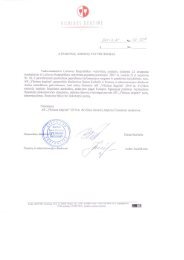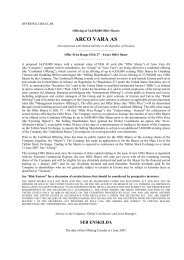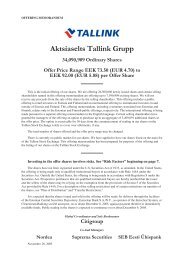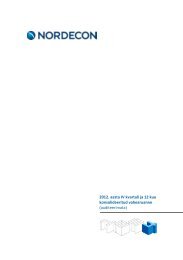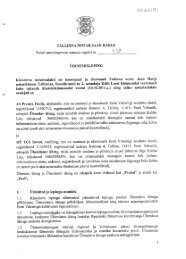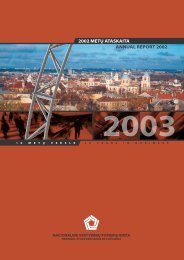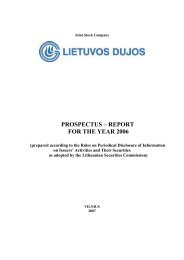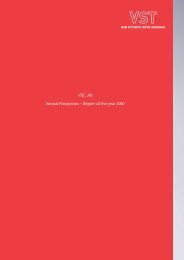AB „SNAIGĖ“ - NASDAQ OMX Baltic
AB „SNAIGĖ“ - NASDAQ OMX Baltic
AB „SNAIGĖ“ - NASDAQ OMX Baltic
You also want an ePaper? Increase the reach of your titles
YUMPU automatically turns print PDFs into web optimized ePapers that Google loves.
Consolidated annual report for year 2008<br />
PRINCIPLES/ RECOMMENDATIONS<br />
3.9. Necessary information on conclusions the collegial<br />
body has come to in its determination of whether a<br />
particular member of the body should be considered to<br />
be independent should be disclosed. When a person is<br />
nominated to become a member of the collegial body, the<br />
company should disclose whether it considers the person<br />
to be independent. When a particular member of the<br />
collegial body does not meet one or more criteria of<br />
independence set out in this Code, the company should<br />
disclose its reasons for nevertheless considering the<br />
member to be independent. In addition, the company<br />
should annually disclose which members of the collegial<br />
body it considers to be independent.<br />
3.10. When one or more criteria of independence set out<br />
in this Code has not been met throughout the year, the<br />
company should disclose its reasons for considering a<br />
particular member of the collegial body to be<br />
independent. To ensure accuracy of the information<br />
disclosed in relation with the independence of the<br />
members of the collegial body, the company should<br />
require independent members to have their<br />
independence periodically re-confirmed.<br />
3.11. In order to remunerate members of a collegial body<br />
for their work and participation in the meetings of the<br />
collegial body, they may be remunerated from the<br />
company’s funds. 7 . The general shareholders’ meeting<br />
should approve the amount of such remuneration.<br />
YES/NO<br />
/NOT<br />
APPLIC<strong>AB</strong>LE<br />
NO No such practice exists.<br />
COMMENTARY<br />
NO No such practice or requirements existed.<br />
NOT<br />
APPLIC<strong>AB</strong>LE<br />
Principle IV: The duties and liabilities of a collegial body elected by the general shareholders’ meeting<br />
The corporate governance framework should ensure proper and effective functioning of the collegial body elected by the general<br />
shareholders’ meeting, and the powers granted to the collegial body should ensure effective monitoring 8 of the company’s<br />
management bodies and protection of interests of all the company’s shareholders.<br />
6 It is notable that currently it is not yet completely clear, in what form members of the supervisory board or the board may be<br />
remunerated for their work in these bodies. The Law on Companies of the Republic of Lithuania (Official Gazette, 2003, No 123-<br />
5574) provides that members of the supervisory board or the board may be remunerated for their work in the supervisory board or the<br />
board by payment of annual bonuses (tantiems) in the manner prescribed by Article 59 of this Law, i.e. from the company’s profit.<br />
The current wording, contrary to the wording effective before 1 January 2004, eliminates the exclusive requirement that annual<br />
bonuses (tantiems) should be the only form of the company’s compensation to members of the supervisory board or the board. So it<br />
seems that the Law contains no prohibition to remunerate members of the supervisory board or the board for their work in other<br />
forms, besides bonuses, although this possibility is not expressly stated either.<br />
8 See Footnote 3.<br />
Prepared by U<strong>AB</strong> FMĮ „Orion Securities“ p. 44





